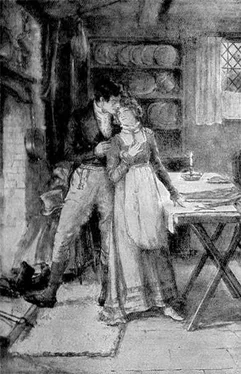Шарлотта Бронте - Shirley
Здесь есть возможность читать онлайн «Шарлотта Бронте - Shirley» весь текст электронной книги совершенно бесплатно (целиком полную версию без сокращений). В некоторых случаях можно слушать аудио, скачать через торрент в формате fb2 и присутствует краткое содержание. Год выпуска: 2014, Издательство: epubBooks Classics, Жанр: Классическая проза, на английском языке. Описание произведения, (предисловие) а так же отзывы посетителей доступны на портале библиотеки ЛибКат.
- Название:Shirley
- Автор:
- Издательство:epubBooks Classics
- Жанр:
- Год:2014
- ISBN:нет данных
- Рейтинг книги:3 / 5. Голосов: 1
-
Избранное:Добавить в избранное
- Отзывы:
-
Ваша оценка:
- 60
- 1
- 2
- 3
- 4
- 5
Shirley: краткое содержание, описание и аннотация
Предлагаем к чтению аннотацию, описание, краткое содержание или предисловие (зависит от того, что написал сам автор книги «Shirley»). Если вы не нашли необходимую информацию о книге — напишите в комментариях, мы постараемся отыскать её.
Shirley — читать онлайн бесплатно полную книгу (весь текст) целиком
Ниже представлен текст книги, разбитый по страницам. Система сохранения места последней прочитанной страницы, позволяет с удобством читать онлайн бесплатно книгу «Shirley», без необходимости каждый раз заново искать на чём Вы остановились. Поставьте закладку, и сможете в любой момент перейти на страницу, на которой закончили чтение.
Интервал:
Закладка:
Here the harsh voice of Donne broke in on the mild tones of Mr. Hall. "Ahem!" he began, clearing his throat evidently for a speech of some importance—"ahem! Miss Keeldar, your attention an instant, if you please."
"Well," said Shirley nonchalantly, "what is it? I listen. All of me is ear that is not eye."
"I hope part of you is hand also," returned Donne, in his vulgarly presumptuous and familiar style, "and part purse. It is to the hand and purse I propose to appeal. I came here this morning with a view to beg of you―"
"You should have gone to Mrs. Gill; she is my almoner."
"To beg of you a subscription to a school. I and Dr. Boultby intend to erect one in the hamlet of Ecclefigg, which is under our vicarage of Whinbury. The Baptists have got possession of it. They have a chapel there, and we want to dispute the ground."
"But I have nothing to do with Ecclefigg. I possess no property there."
"What does that signify? You're a churchwoman, ain't you?"
"Admirable creature!" muttered Shirley, under her breath. "Exquisite address! Fine style! What raptures he excites in me!" Then aloud, "I am a churchwoman, certainly."
"Then you can't refuse to contribute in this case. The population of Ecclefigg are a parcel of brutes; we want to civilize them."
"Who is to be the missionary?"
"Myself, probably."
"You won't fail through lack of sympathy with your flock."
"I hope not—I expect success; but we must have money. There is the paper. Pray give a handsome sum."
When asked for money, Shirley rarely held back. She put down her name for £5. After the £300 she had lately given, and the many smaller sums she was giving constantly, it was as much as she could at present afford. Donne looked at it, declared the subscription "shabby," and clamorously demanded more. Miss Keeldar flushed up with some indignation and more astonishment.
"At present I shall give no more," said she.
"Not give more! Why, I expected you to head the list with a cool hundred. With your property, you should never put down a signature for less."
She was silent.
"In the south," went on Donne, "a lady with a thousand a year would be ashamed to give five pounds for a public object."
Shirley, so rarely haughty, looked so now. Her slight frame became nerved; her distinguished face quickened with scorn.
"Strange remarks?" said she—"most inconsiderate! Reproach in return for bounty is misplaced."
"Bounty! Do you call five pounds bounty?"
"I do; and bounty which, had I not given it to Dr. Boultby's intended school, of the erection of which I approve, and in no sort to his curate, who seems ill–advised in his manner of applying for, or rather extorting, subscriptions—bounty, I repeat, which, but for this consideration, I should instantly reclaim."
Donne was thick–skinned. He did not feel all or half that the tone, air, glance of the speaker expressed. He knew not on what ground he stood.
"Wretched place this Yorkshire," he went on. "I could never have formed an idea r of the country had I not seen it. And the people—rich and poor—what a set! How corse and uncultivated! They would be scouted in the south."
Shirley leaned forwards on the table, her nostrils dilating a little, her taper fingers interlaced and compressing each other hard.
"The rich," pursued the infatuated and unconscious Donne, "are a parcel of misers, never living as persons with their incomes ought to live. You scarsley"—(you must excuse Mr. Donne's pronunciation, reader; it was very choice; he considered it genteel, and prided himself on his southern accent; northern ears received with singular sensations his utterance of certain words)—"you scarsley ever see a fam'ly where a propa carriage or a reg'la butla is kep; and as to the poor—just look at them when they come crowding about the church doors on the occasion of a marriage or a funeral, clattering in clogs; the men in their shirt–sleeves and wool–combers' aprons, the women in mob–caps and bed–gowns. They positively deserve that one should turn a mad cow in amongst them to rout their rabble–ranks. He–he! what fun it would be!"
"There! you have reached the climax," said Shirley quietly. "You have reached the climax," she repeated, turning her glowing glance towards him. "You cannot go beyond it, and," she added with emphasis, "you shall not, in my house."
Up she rose—nobody could control her now, for she was exasperated—straight she walked to her garden gates, wide she flung them open.
"Walk through," she said austerely, "and pretty quickly, and set foot on this pavement no more."
Donne was astounded. He had thought all the time he was showing himself off to high advantage, as a lofty–souled person of the first "ton;" he imagined he was producing a crushing impression. Had he not expressed disdain of everything in Yorkshire? What more conclusive proof could be given that he was better than anything there? And yet here was he about to be turned like a dog out of a Yorkshire garden! Where, under such circumstances, was the "concatenation accordingly"?
"Rid me of you instantly—instantly!" reiterated Shirley, as he lingered.
"Madam—a clergyman! turn out a clergyman!"
"Off! Were you an archbishop you have proved yourself no gentleman, and must go. Quick!"
She was quite resolved. There was no trifling with her. Besides, Tartar was again rising; he perceived symptoms of a commotion; he manifested a disposition to join in. There was evidently nothing for it but to go, and Donne made his exodus, the heiress sweeping him a deep curtsy as she closed the gates on him.
"How dare the pompous priest abuse his flock! How dare the lisping cockney revile Yorkshire!" was her sole observation on the circumstance, as she returned to the table.
Ere long the little party broke up; Miss Keeldar's ruffled and darkened brow, curled lip, and incensed eye gave no invitation to further social enjoyment.
Chapter XVI
Whitsuntide
The fund prospered. By dint of Miss Keeldar's example, the three rectors' vigorous exertions, and the efficient though quiet aid of their spinster and spectacled lieutenants, Mary Ann Ainley and Margaret Hall, a handsome sum was raised; and this being judiciously managed, served for the present greatly to alleviate the distress of the unemployed poor. The neighbourhood seemed to grow calmer. For a fortnight past no cloth had been destroyed; no outrage on mill or mansion had been committed in the three parishes. Shirley was sanguine that the evil she wished to avert was almost escaped, that the threatened storm was passing over. With the approach of summer she felt certain that trade would improve—it always did; and then this weary war could not last for ever; peace must return one day. With peace, what an impulse would be given to commerce!
Such was the usual tenor of her observations to her tenant, Gérard Moore, whenever she met him where they could converse; and Moore would listen very quietly—too quietly to satisfy her. She would then by her impatient glance demand something more from him—some explanation, or at least some additional remark. Smiling in his way, with that expression which gave a remarkable cast of sweetness to his mouth, while his brow remained grave, he would answer to the effect that himself too trusted in the finite nature of the war; that it was indeed on that ground the anchor of his hopes was fixed; thereon his speculations depended. "For you are aware," he would continue, "that I now work Hollow's Mill entirely on speculation. I sell nothing; there is no market for my goods. I manufacture for a future day. I make myself ready to take advantage of the first opening that shall occur. Three months ago this was impossible to me; I had exhausted both credit and capital. You well know who came to my rescue, from what hand I received the loan which saved me. It is on the strength of that loan I am enabled to continue the bold game which, a while since, I feared I should never play more. Total ruin I know will follow loss, and I am aware that gain is doubtful; but I am quite cheerful. So long as I can be active, so long as I can strive, so long, in short, as my hands are not tied, it is impossible for me to be depressed. One year—nay, but six months—of the reign of the olive, and I am safe; for, as you say, peace will give an impulse to commerce. In this you are right; but as to the restored tranquillity of the neighbourhood, as to the permanent good effect of your charitable fund, I doubt. Eleemosynary relief never yet tranquillized the working–classes—it never made them grateful; it is not in human nature that it should. I suppose, were all things ordered aright, they ought not to be in a position to need that humiliating relief; and this they feel. We should feel it were we so placed. Besides, to whom should they be grateful? To you, to the clergy perhaps, but not to us mill–owners. They hate us worse than ever. Then the disaffected here are in correspondence with the disaffected elsewhere. Nottingham is one of their headquarters, Manchester another, Birmingham a third. The subalterns receive orders from their chiefs; they are in a good state of discipline; no blow is struck without mature deliberation. In sultry weather you have seen the sky threaten thunder day by day, and yet night after night the clouds have cleared, and the sun has set quietly; but the danger was not gone—it was only delayed. The long–threatening storm is sure to break at last. There is analogy between the moral and physical atmosphere."
Читать дальшеИнтервал:
Закладка:
Похожие книги на «Shirley»
Представляем Вашему вниманию похожие книги на «Shirley» списком для выбора. Мы отобрали схожую по названию и смыслу литературу в надежде предоставить читателям больше вариантов отыскать новые, интересные, ещё непрочитанные произведения.
Обсуждение, отзывы о книге «Shirley» и просто собственные мнения читателей. Оставьте ваши комментарии, напишите, что Вы думаете о произведении, его смысле или главных героях. Укажите что конкретно понравилось, а что нет, и почему Вы так считаете.











